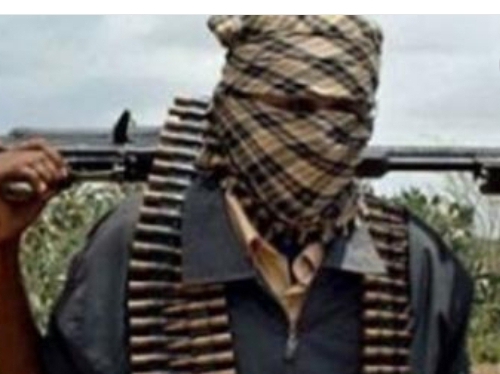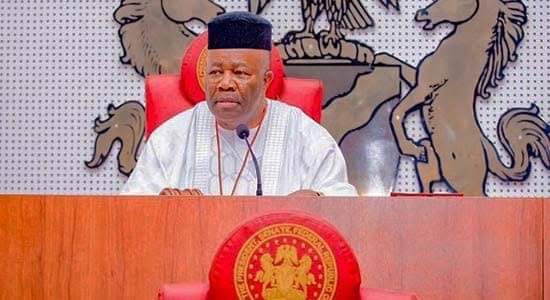Buhari Won’t Sign Electoral Bill if… – Says AGF, Malami
AGF, Malami says Buhari Won’t Sign Electoral Bill if…
The Minister of Justice and Attorney-General of the Federation, Abubakar Malami (SAN), has hinted that the President, Major General Muhammadu Buhari (retd.), may withhold assent from the Electoral Act (Amendment) Bill if it is considered to have proposals based on personal interests.
According to the minister, the bill, which the National Assembly transmitted to the Presidency the second time on Monday last week, just got to him on Monday for legal advice.
Malami made this known while appearing on Politics Today, a current affairs programme on Channels Television which our correspondents monitored on Monday.
Buhari had withheld assent to the first version of the bill last year after consulting the Malami and the Independent National Electoral Commission, among others, on the bill.
When asked if he was satisfied with the amendments made to the bill by the National Assembly after Buhari sent it back to the parliament, Malami said, “In terms of satisfaction, honestly, it is premature for me to conclude, taking into consideration (that) I can admit to you that the electoral bill was only received in my office this afternoon as I was preparing to come over for this engagement with Channels TV.
I am working for advancement of democracy, Malami insists
“So, I have not taken steps to review the content and context of what has been presented for consideration for the President. So, it is premature and pre-emptive for me at this moment, now to arrive at any conclusion, taking into consideration that I have not gone through the document to understand what it contains and then analyse the same in accordance with the constitution and the prevailing laws.”
When asked if he loved democracy and wanted the advancement of the same, being someone who had been involved in political party activities, the minister interjected, “I am working for the advancement of democracy and the democratic system.”
Responding to a question on if he was willing to assist Buhari to pass what the President said he wanted to leave behind as a legacy of good elections for Nigeria; and if the bill might get passed by Buhari, the minister said, “Honestly, without going through or reading through, I am not in a position to assess whether the bill, indeed, has factored the national and public interest, as against selfish interest, among others; whether it is a bill that can stand the test of constitutionality and legality.”
I will advise Buhari not to sign bill if it is against dictates of democracy – AGF
When asked if he would advise the President to reject the amended bill if he was not satisfied with the new version, Malami said, “Certainly, if I am not satisfied and if I am of the opinion that it is against the public interest, the national interest; and then against the dictates of democratic process, I would advise accordingly.”
He added, “But then, one thing I can tell you is that we are all interested in leaving behind a legacy of a lasting democracy; a democracy that indeed accommodates the collective interest of the Nigerian state, and eventually advances the national interest, national development and deepens the democratic process.
“So, with these considerations associated with deepening democracy; with the considerations associated with the national and public interest, we will certainly do whatever it takes to move democracy to the next level.”
When asked to express to Nigerians, his commitment to deepening democracy in Nigeria, the minister stated that his office is a constitutional one, which is fundamentally governed by public interest. “And when we are talking of the public interest, I am talking of the interest of 200 million Nigerians. I will be guided at all times by my oath of office associated with public interest, exclusive of the sentiments or the feelings,” he added.
Both the Senate and the House of Representatives had reworked the electoral bill for the second time by concurring on consensus candidacy and setting fresh conditions for political parties in the nomination of candidates for elections.
The President had last year vetoed the electoral bill and sent it back to the National Assembly over the restriction of political parties to direct primary, insisting on the direct or indirect.
The House had amended Clause Section 87 of the Electoral Act 2010, which is Clause 84 of the Electoral Act (Amendment) Bill, by inserting the indirect primary option.
The Senate, however, not only added indirect primary but also consensus adoption of candidates for elections by a political party.
By passing different amendments to the bill, the Senate and the House were expected to refer the versions to a conference committee to harmonise the differences and report back for final passage and transmission to the President for assent.
However, both the Senate and the House of Representatives, last week, took a shorter route by rescinding their decisions on the amendments last week and re-amending the electoral bill.
This time, the House concurred with the Senate on the consensus, while both chambers passed the same conditions set for the option.
The President had said in his interview with Channels TV on January 5, 2022 that he would sign the bill once the mandatory direct primary clause was removed.
He said, “All I said was that there should be options. We must not insist that it should be direct (primary); there should also be consensus and indirect (primary options) and if they do that, I will sign. I will sign. All I would like is that there should be options. Allow them (political parties) to have other options.”
AGF speaks on TI Hushpuppi, CP Abba Kyari’s trials in US, Magu, Babachir
Meanwhile, the AGF also dismissed the recent Corruption Perception Index released by the global anti-corruption campaign organisation, Transparency International, which rated Nigeria as the second most corrupt country in West Africa, after Guinea and 154th out of 180 countries ranked globally.
According to Malami, the regime led by the President, Major General Muhammadu Buhari (retd.), has been rated highly by global bodies over its anti-corruption drive.
The minister also refused to speak more on the trial of a former Secretary to the Government of the Federation, Babachir Lawan, over alleged corruption, stating that it is a judicial affair.
The AGF also avoided giving full details on the indictment and the possibility of prosecuting a former Acting Chairman of the Economic and Financial Crimes Commission, Ibrahim Magu.
Malami also described the trial of a Dubai-based Instagram sensation, Ramon Abbas, popularly known as Hushpuppi, in the United States of America over alleged Internet fraud as an international affair.
The AGF also said the American Government and the Nigerian Government are discussing the possible extradition of the suspended Head of the Intelligence Response Team of the Nigeria Police Force, DCP Abba Kyari, for his alleged role in a $1m scam allegedly perpetrated by Hushpuppi and five others.
The minister also said reasonable grounds for suspicion have been established against Kyari.
Malami spoke on Monday while featuring on Channels Television’s ‘Politics Today’ programme.
The Nigeria Police Force had probed Kyari and transmitted its findings to Malami for “legal opinion.”
Malami said, “It is an issue that has international and national dimensions. Actions have been taken, it is a work in process locally and internationally and we are doing whatever it takes to ensure justice is done within the context of the law regardless of the personalities that are involved.
“When criminality is involved, Nigeria and the US naturally work together when there are elements of the offences that have taken place in the diverse jurisdictions. So, Nigeria is doing the needful by way of supporting what America is doing for the purpose of ensuring that the cases are tried accordingly within the American context of it. And then, eventually, if there is a need for local prosecution, nothing stops it.”
Commenting on the probe of Kyari, the AGF said, “There are a lot of issues that are ongoing inclusive of the possibility of consideration for extradition. That is where the collaboration element of it comes into play.”
Asked if a request for Kyari’s extradition had been made by the US Federal Bureau of Investigation, the minister said, “There could be a need or perhaps the possibility of making such a request.”
He added, “As far as I am concerned, the parties are discussing, the parties are collaborating, there are exchanges of correspondence from the perspective of investigation, from the perspective of extradition, and associated things.
“Reasonable grounds for suspicion have been established and that will eventually translate to the possibility of prosecution and conviction if indeed one is adjudged guilty by the law.”
FBI Special Agent, Andrew Innocenti, had alleged that Hushpuppi contracted the services of Kyari after a “co-conspirator,” Chibuzo Vincent, allegedly threatened to expose the alleged $1.1m fraud committed against a Qatari businessman.
Innocenti, who said he obtained voice calls and WhatsApp conversations between Kyari and Hushpuppi, had also alleged that the latter paid the police officer N8m or $20,600 for the arrest and detention of Vincent.
The United States Attorney’s Office at the Central District of California had ordered the FBI to arrest Kyari almost a year ago.
Kyari had taken to Facebook on July 29, 2021, to deny the allegations, but he later deleted the post after editing it about 12 times.
The Inspector-General of Police, Usman Baba, had recommended the suspension of Kyari, which the Police Service Commission carried out on July 31, 2021.
The police boss had on August 2, 2021, constituted the Special Investigation Panel headed by the Deputy Inspector-General of Police in charge of the Force Criminal Investigations Department, Joseph Egbunike, to probe the allegations.
The findings of the probe panel had been transmitted to the AGF office which is responsible for matters regarding extradition, repatriation and transfer of suspects or wanted persons.
Hushpuppi, who pleaded guilty to various offences bordering on internet scam and money laundering, among others, risks “20 years’ imprisonment; a 3-year period of supervised release; a fine of $500,000 or twice the gross gain or gross loss resulting from the offence.”
Electoral Bill












































